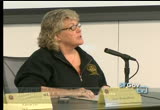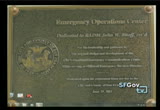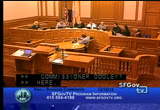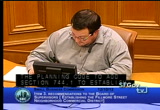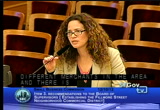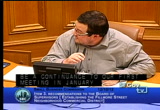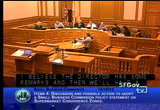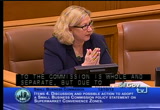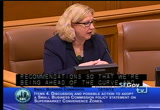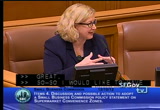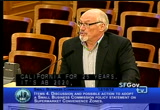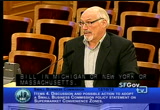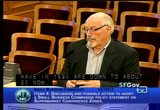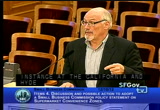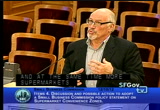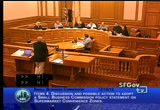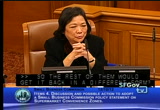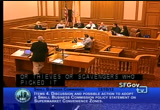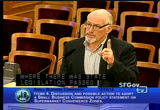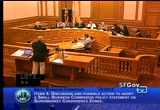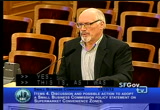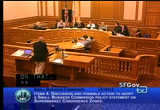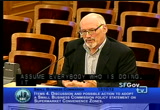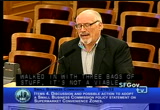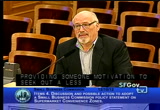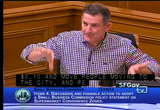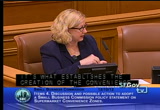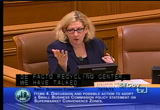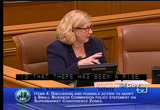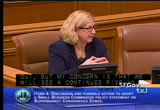tv [untitled] December 26, 2012 4:00pm-4:30pm PST
4:00 pm
we're almost through folks. any announcements by disaster council members? anything pressing? okay. awesome. is there any general public comment ? hearing none i would like to thank you all for coming. remind you that we are having a little reception for admiral bitoff over here. please check out his plaque after you have cake with us and thank you very much and go giants. [applause] >> >> >>
4:01 pm
>> at this time we would like to ask everyone to please turn off your cell phones or pagers and turn them to silent and we would like to thank sfgovtv and city services. the meeting is being called to order and the first item is roll call, president adams? >> here? >> commissioner dooley? >> here. >> commissioner dwight? >> here. >> commissioner o'brien? >> commissioner ortiz-cartagena-here. >> reporter: commissioner white is excused. >> commissioner yee riley?
4:02 pm
>> here. >> commissioners item no. 2 is general public comment, allows members of the public to comment generally on matters within the commission's purview. >> do we have anyone here from the public who would like to comment on items not on today's agenda? seeing none, public comment is closed. next item, please? >> commissioners you are on item no. 3 discussion and possible action to make recommendations to the board of supervisors on board of supervisors file no. 120814, planning code establishing the fillmore street neighborhood commercial district. this is an ordinance amending the planning code to add section 744.1 to establish the fillmore street ncd along fillmore streets between bush and fulton. in your binder is the file no., along with the commission summary. and we have a presentation by stephanie tucker, legislative
4:03 pm
aide to supervisor olague. >> welcome. >> good evening, commissioners. my name is stephanie tucker and i'm actually before you today to ask for a continuance. there needs to be a lot more discussion around the zoning controls for the fillmore ncd and given that it's the holiday season, the merchants of the fillmore area won't be available to have a meeting until after the holidays. so that is end the december/early january. so we don't feel good about moving forward until we have had that discussion with the merchants, and everybody is on the same page as far as moving forward with the zoning controls. we have been speaking with different merchants in the area and there is a considerable amount of support for this. so i just wanted to let you know that the feedback has been very positive. but they do need to kind of come together as a group and vote on these zoning controls, and so we don't feel comfortable moving forward
4:04 pm
until that vote has happened. so right now we have asked for the planning commission to continue this to, i think it's january 13th. so if we could get it scheduled before you around that time, that would be wonderful. thank you. >> great. thank you. >> i am available to answer any questions, if you have any. >> do we have any commissioner comments? public comment on item no. 3? seeing none, public comment is closed. do we have a motion for a continuance? >> i move. >> i will second. >> commissioners, would that be a continuance to our first meeting in january is january 14th, 2013. >> yes. >> would that be the date you would move to continue to? >> okay. >> that is motion by commissioner dooley and who was the second? >> yee riley. >> commissioners we have a motion to continue file no.
4:05 pm
120814 to the january 14th, 2013 commission meeting. on that motion, it was a motion made by commissioner dooley and seconded by commission yee riley. >> commission adams? >> yes. >> commissioner dooley? >> yes. >> commissioner dwight? >> yes. >> commissioner o'brien? >> yes. >> commissioner ortiz-cartagena? >> yes. >> commissioner white is absent. >> commissioner yee riley? >> yes. >> commissioners that motion passes 6-0. >> great. thank you. next item, please. >> >> commissioners item no. 4 is discussion and possible action to adopt a small business commission policy statement on supermarket convenience zones. i believe the director has some remarks and then we'll have a presentation from the department of the environment. >> yes, commissioners the office became aware of some issue s around convenience zones and small businesses back
4:06 pm
in 2012 when we met with the business of south of market and so taking a look at the convenience zones and it's relationship -- the establishment of crv redemption convenience zones and it's relationship to small businesses has been something that has been on our docket to review and discuss with the commission and to set some forward-policy direction to the city. and i want to be very clear while the timing of this is sort of coinciding with the hank eviction. this is not being done -- the timing of this coming forward to the commission is whole and separate, but due to a need that the commission does need to develop a policy because we have had a reduction of a recycling center from the cala site at california and hyde and we were going to be having some
4:07 pm
change orders and there is prediction that it will be going out of business and well is have new owners there and we have new supermarkets opening up in the city, so there is sort of a very, kind of, unique law and relationship around these convenience zones. the crv redempt zones and how they are created and how the state law require that they are managed and facilitated and what this means to small business. so i want to put forward some proactive policy recommendations so that we're being ahead of the curve and not waiting until this may become an issue down the road for small businesses. so i just wanted to just make that clear. this is a policy discussion for you to take a look at, make recommendations. the commission can take action
4:08 pm
tonight, if it's comfortable or wait until the next commission meeting or two commission meetings. it's at your discretion to make sure that you are comfortable with the policy that is flushed out to be put forward to our policymakers in the city. so i just wanted to make sure that you understood that it's agendized as an action item tonight, but we do that as pro forma, as part of agendizing anything that the commission may be taking action on in case you want to take action tonight, but that is not necessarily the objective tonight. >> great. >> so-so i would like to have a substantive policy discussion , make sure that you are well-informed and briefed. because it's not that simple. it has taken chris and a little while to kind of wrap our head as round it. so i want to make sure that you get a full briefing from kevin drew, from
4:09 pm
the department of environment, any information that we might be able to add. and then take a look at what some of the recommendations are and get your feedback on those and if there are any others that you think should be included. so kevin, how about if you can just come up and walk us through. >> welcome. >> thank you, my name is kevin drew. i am the residential and special projects zero waste coordinator for the department of environment and i have been working on the bottle bill that is known colloquial in california for 25 years. it's ab 2020, passed in 1986 to get beverage containers out of the waste stream and it's actually called the recycling litter reduction act, two-fold
4:10 pm
to get at recycling and reduce litter. it puts a nickel or dime redemption value in california. it has grown since 1986 with the redemption value was a penny and as over time it's grown up to the nickel and dime that you are familiar with now. what the law intends is for consumers to be able to conveniently get that nickel or dime that they pay back from a recycler as part of their daily going about their business. it's different than bottle bills in other states if you are familiar with the bottle bill in michigan or new york or massachusetts. you can take your bottle back to any store and get your nickel or dime back. this was intended to consolidate those many sites
4:11 pm
into more larger sites on typically supermarket parking lots. that is really where, as opposed to in the store, it's in the parking lot. that is how the law was set up in san francisco we have about 50 stores that qualify as supermarkets for convenience sake, we, the state, set up a system where only about 30 of those were recycling centers back in 1986. over time, through real estate consolidation, the closing of supermarkets or the reduction of parking lots that we have seen, those 30 that we used to have in 1990 are down to about 20 now. at the same time, the number of containers that we get money back for is much greater. there is now water bottles, juice boxes, a lot of things that didn't used to be in the law that are now in the law. so there is a tremendous amount
4:12 pm
of volume going through this and amounts to about $17 million a year in redemption value that goes back to the consumer in san francisco alone. of that $17 million, about $12 goes to recyclers through recycling centers and $6 of it goes to the curbside program. so i hope i'm not going too fast here, but if there are any questions, please stop me. so the problem at the moment is that there are fewer recycling centers than there used to be, it's less convenient for consumers to get their money back. the odd quirk of the law when a recycling center is no longer serving a supermarket, if for instance at the california and hyde store, the new plan for traders joe does not include putting the recycling center in the basement of the cala back into play and because of that, that zone around the supermarket will no longer be
4:13 pm
what is called "served" by the state. the state goes into an action that all beverage dealers in the zone, that would be 30-50 corner stores, liquor stores, pharmacies even, they all have to now take redemption value back into the store. and that is where the pressure has turned from being at the supermarket, where there is enough space to a lot of places where there is not enough space. we're facing that more and more in san francisco over the last few years as these recycling centers have closed. as your executive director mention there had is more pressure on more recycling centers closing and at the same time more supermarkets opening. so i think our department is struggling with how to kind of, in a tight real estate market, find space for recycling. and you all know how a
4:14 pm
lightning rod recycling can be. we're working hard to find additional locations and we're working with community groups and other city and state agencies to find space on other parking lots or to find ideally something like building it into the next generation of supermarkets would be the ideal scenario. for instance the parking structure that might go along with those supermarkets. let me stop there and see if there are any questions that you have or any particular points you would like to spend a little more time on. >> commissioner comments ? questions? commissioner riley? >> hi. >> hi. >> thank you for the presentation. >> sure. >> i have a question. right now if a family, they pay a nickel for the bottle, like a whole case of water. and they decided to put the empty bottles into the blue
4:15 pm
bin, and then it's picked up by the recyclers. so if that is the case, who gets that nickel? >> that nickel goes -- when the blue cart gets taken from the ecology trucks and taken down to what is called pier 96, the sorting facility. all of that material is weighed as a group and ecology files a report to the state and gets that money back. >> i see. >> and actually that money is that dollar value is included in the garbage rates. i am with one of the staff that helps set the garbage rates and we evaluate the flow of money, including that money. so that is included in the calculation. >> so the rest of them would get it back in a different form? >> yes. >> okay. do you have -- what? >> much of it is diverted. >> yes. so was there any study done of how many families actually will take the bottles
4:16 pm
back to the retailer to get nickels back or most of them would just put it in the recycled bin? >> we don't have any deep data on that. the simplest thing is as i mentioned there is about $17 million, $18 million a year and about two-thirds of that goes to recyclers in the form of cash payments for them bringing their bottles and cans to recycling centers and one-third of it goes to ecology. whether that two-thirds, that $12 million is done by individual family members or by groups of people that have organized to get the material, or thieves or scavengers who picked it up, we don't know that. >> thank you. >> any other questions? where does the $100 a day go that retailers pay? >> that goes back to the state. it's called cal recycle, a division of the state.
4:17 pm
and i believe it just goes into their general fund. they are funded by the redemption -- the nickels and dimes that are not redeemed. it's called "the fund." it's the money that is used to pay consumers back and there is only about 80% of bottles and cans that are returned. so there is an extra amount that helps to run the organization. i believe that funding goes back into that pot. >> okay. other jurisdictions are using mobile vending as an option to comply with the law. do you know of any that are successful? >> there is really one real example, actually is san diego. where there was state legislation passed to allow three supermarkets to share one -- essentially one recycling center that moved for two days, two days, two days to each supermarket on a very set scheduled. so that the customers could get used to. it the state is very particular
4:18 pm
about running enough hours at certain times of the day, to be certified by the state. so a mobile option has been -- is functioning now in other parts of state. we have talked with the cal recycle staff and they are open to the situation that we have here in san francisco. they understand the density and the difficulty for real estate. so i think a mobile option is out there. >> i have a question about -- my understanding is that the state law was put into place kind of thinking more about the suburbs and places that have large supermarkets and parking lots. >> right. >> convenience zones. >> i think that is there interest in amending this for large, dense urban areas? >> i think that is what i mean when i said, "we have spoken with staff at cal recycle." and san francisco is the densest
4:19 pm
part of california and many, many other parts of state the supermarket parking lots are plenty big and there is not an issue of lack of space. that is why there is some sensitivity on their part of helping us craft a solution. >> what do you think about the idea of having larger convenience zones that could be accessed by public transportation rather than keeping so many of the convenience corridors, if we don't have space for it? is there some kind of way to work with that and have more -- fewer, but larger or >> i think you mean fewer, but smaller? >> yes. >> this is, as i was mentioning back in 1986-87, the then director of our department worked with the state to kind of take the existing supermarkets and kind of spread the recycling centers around. i think that now we have had
4:20 pm
attrition based upon real estate, not upon convenience. so the idea of finding a way to get back convenience is one way that is something that i think the state would look favorably upon. because convenience is a driver, absolutely a driver in this law. one of the concerns or one of the ideas -- i have heard concerns from homeowners/consumers who say there is not a place for me to take my bottles and cans. it's far from my house and have i to drive there and it's a huge, long line when i get there. so there is anecdotal evidence that more centers where people could get to, they would take their material back. again, we haven't done a study on that. >> any other commissioner comments? >> i have one question. i mean, in san francisco in particular, relatively affluent community, is there really that much demand for a redemption center as opposed to we have a
4:21 pm
very good curbside recycling and i imagine most of the stuff end ups in the blue bin without anybody thinking oh, i could get $0.05 for this? >> that is my experience as well and going to recycling centers and seeing what is happening there, while there is certainly a robust of independent scavengers/poachers, there is a constant flow of people from restaurants, getting that money back and people bringing their kids collecting it for school or their own purposes. you would be surprised. i think it's quite easy to assume everybody who is doing. it it's funny, even those folks that you think are up to nefarious intent are out there picking it off the streets and they are asking people for it and getting it. i see a lot of good intent, as well as that.
4:22 pm
>> i'm not suggesting that -- i'm not trying to place value judgment on it other than it is, in fact, illegal. it seems to me that that protocol is entirely different though. those are people who have scavenging with purpose. and so they will map their routes, based on where they think they can find the material and where they can redeem it. so the notion of convenience every block is really not the issue there. it is is there a place they can get to with their load? the other problem is when you have a convenience store and someone walked in with three bags of stuff, it's not a viable option either. >> that is what we're trying to avoid. i have worked with the zone down near union square is not served. one the pharmacies down there has been very diligently buying back in-store and then trying
4:23 pm
to solve the problem. and they got a backroom that is full of stuff and then there are ants and rats and it's a real problem. so that is not the solution. and i think we need some time to figure out a rejiggering of what was a system from 20 or so years ago that needs to be updated. i appreciate your commission's thoughts on that coming up with the answers that work. >> in some ways scavenging helps to solve the problem, taking a distributive issue and providing someone motivation to seek out a less concentrated footprint of redemption centers. >> it does. it does. i this we're at some kind of weird critical point where there is just too few. economic conditions have certainly driven the current situation. there were, when i started
4:24 pm
doing this, there might have been one person going around and poking through cans and now three or four times in a given evening different sets of folks will pass by. and so it's something that we have to try to face, even that, how do we work that into what the new situation would be? >> right. it's polarizing. >> yes. >> the same thing works in the other direction. indigents and affluents are both two ends of the spectrum. one is driving collection and one is driving i don't really care and hopefully i feel i should recycle, but i don't really care about the $0.05 or $0.10 and move people moving to the city, and rents are going up and more people moving in, is affecting both ends of spectrum. more stuff and less people that care about the $0.05 and $0.10. >> we see that not only on
4:25 pm
redemptionion value, but consumption, there is something going on. more people, higher income, less time, you know? and it creates this pressure. >> $100 a day is an onerous -- for a convenience store it is. >> the $100, it's the funny thing, it's the $100 to the convenience store or supermarket and that feels unlevel -- not a level playing field there. >> right. >> director dick-endrizzi? >> so just a couple of points. just to sort of in terms of starting let's say from fresh or anew. a supermarket opens. it's what establishes the creation of the convenience zone and i think kevin talked about this. if that supermarket didn't open, then the small businesses, can they choose on their own to do redemption or is it against the law if you
4:26 pm
are not in a con [srao-pbs/] necticut convenience center? >> you couldn't choose to do it on their own. i mean they would have to go through a process to be proactive in that respect. >> that is one of the key identifiers. in some ways by default the small businesss in the area and in our situation it's more likely that it's going to be a small business that it will be absorbing it. so it comes the de facto recycling center. we have talked to the department of health and again, just like even though walgreens had called you about issues of cleanliness and what do we do with this? for the department of health, that is definitely an issue, especially for small businesses, because they are often -- they could be
4:27 pm
storing their recycled products in the same place as their food. that is against the law. also many of our small businesses are in mixed-use buildings. so you know, there is the potential of increasing sort of rodents/insects that have the affect for people who are living above. so i think as kevin has identified, it is a very old policy, you know, created in a different time. and for us to create some sort of direction, to have the city and also communicate to the state that we would like to see. another point to let you know is that there has been a rise in what we're calling "unofficial mobile recyclers." people who are not recycling centers, but we have them across the street over at grove and van ness in the evenings.
4:28 pm
so they collect -- they collect cans and the recycling goods from individuals and they take it to recycling centers. so i anticipate that -- because kevin and i had this discussion as we looked at mobile retail, you know, because it's been talked about should we do something about making sure that these entities operate as a business? but then, there is the complexity of are they a recycling center or not a recycling center? so the complexities around this issue about mobile need to be plushed out, but my concern is that we will see a continued rise in these individuals who are doing recycling -- purchasing crv redemption goods off the street and they could also possibly begin to show up more and more in the neighborhoods.
4:29 pm
especially if we do have a reduction in recycling centers. so that is just another factor. so in terms of really encouraging the state to take a look at coming to some sort of strong recommendations and guidance around being able to create established mobile recyclers would probably benefit us. because it is happening de facto. >> right. >> it's an underground economy. >> yes. >> any other comments? >> is there any other cities that are doing the mobile recycling? >> no, just that one. >> san diego? >> yes, just san diego and i did speak with the folks in sacramento and there is legislation that will address bottle bill -- actually once a year or couple of years that they do a bottle
105 Views
IN COLLECTIONS
SFGTV: San Francisco Government Television Television Archive
Television Archive  Television Archive News Search Service
Television Archive News Search Service 
Uploaded by TV Archive on

 Live Music Archive
Live Music Archive Librivox Free Audio
Librivox Free Audio Metropolitan Museum
Metropolitan Museum Cleveland Museum of Art
Cleveland Museum of Art Internet Arcade
Internet Arcade Console Living Room
Console Living Room Books to Borrow
Books to Borrow Open Library
Open Library TV News
TV News Understanding 9/11
Understanding 9/11